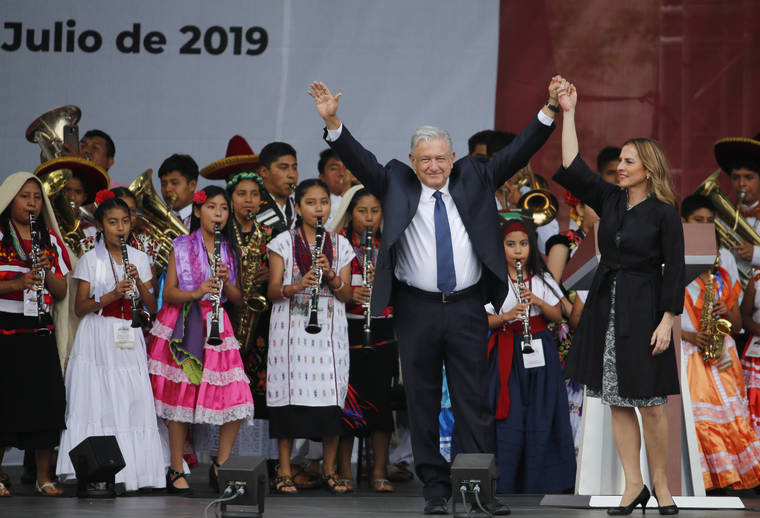MEXICO CITY — Andrés Manuel López Obrador marked the anniversary of winning Mexico’s presidency Monday amid some strange contradictions.
A leftist, he has been more fiscally conservative than any of his predecessors since the 1950s. He has cut the size of government so dramatically it has drawn protests. He has been more openly religious than most Mexican presidents in recent memory.
He still spends most of his days on the campaign trail, holding near daily rallies in outlying states even though he is firmly in control of Congress and the opposition is a fragmented mess.
He has better relations with U.S. President Donald Trump than his conservative predecessor, and has cracked down on migrants harder.
Despite risky economic moves, polls say his approval rating ranges from 66% to 72%, seven months after he took office Dec. 1.
Clearly, many Mexicans are reacting more to his personality — folksy, smiling, humble, incredibly accessible — than any big governmental results. Unlike previous Mexican leaders, he still shakes hands in public, eschews security details, flies economy class on commercial flights and takes selfies with fellow passengers.
“I think he has a good vision, but his proposals, the team he has, I’m not saying they are good or bad. There are just a lot of doubts there,” said Argelia Miranda Vazquez, a government worker who was engaged in a friendly discussion with some López Obrador supporters outside a huge anniversary rally the president held in Mexico City’s main plaza Monday.
Like many, she was charmed by some of his symbolic moves to dismantle the high-level, distant, arrogant presidency of years past, like taking lavish pensions away from ex-presidents. “But aside from that, everything continues the same,” Miranda Vazquez said.
Rubén Jimenez, a López Obrador supporter, agreed that the biggest change has been psychological.
“Things are better, in popular terms, because the people have more hope that things will get better,” Jimenez said. “The government is more democratic, and it is getting closer to the people.”
But even Jimenez agreed that real progress has been slow.
Homicides remain at historic highs, though the rate of increase has slowed. The government oil company is staggering under debt, and some government spending cuts have hampered medical care at state-run hospitals. The business community is spooked by López Obrador’s propensity for rescinding what he feels are unfair infrastructure contracts. The Cabinet, largely composed of newcomers, is on what can be most kindly described as a learning curve.
The Cabinet “is learning, and very slowly,” Jimenez said. “The people’s needs have to be met more — higher wages. We need quicker progress. The National Guard (López Obrador’s new military-based policing force) has to make more rapid progress.”
The 65-year-old president maintains an exhausting schedule of daily morning news conferences, capped off by his outdoor rallies. But though the opposition is disorganized, Mexico is increasingly polarized, in part because López Obrador laughingly dismisses anyone who opposes him as “fifi” — a word that means roughly posh, elite or frivolous.
Constantly whipping up his base while disparaging the opposition is something López Obrador has in common with Trump, or people like conservative Italian Interior Minister Matteo Salvini, says Federico Estevez, a political science professor at the Autonomous Technological Institute of Mexico.
“It’s the new politics, you know. It’s Trump, it’s Salvini, it’s all of them. They all do it. It’s only the establishment that doesn’t do it,” Estevez said. “Obviously, it works.”
The argument that López Obrador is more populist than leftist may have some validity. He has cut out some social programs that went directly to Mexico’s poorest people, and replaced them with handouts — like scholarship and work programs — that go to a broader income band.
He has bent over backward to avoid conflict with Trump, especially on issues like migrants. López Obrador originally ordered Central American migrants be given work and travel visas, and promised investment to create jobs in their home countries. But under Trump’s threats to close the border and impose tariffs on Mexican products, the government has begun raiding trains, buses, hotels and parks to stem the flow of migrants.
While leftists may view that as a betrayal, it plays well among average Mexicans, who appear to be fed up with throngs of Central Americans, Haitians and Africans crossing their country trying to reach the U.S. border.
“He should focus on the people, instead of being compassionate with the migrants who come from other countries,” said Miranda Vazquez. “He should support the people. And the others? Well, let their governments take care of their own people.”
López Obrador has broken with traditional leftist positions on other issues, too. He has little use for environmental restrictions, loves fossil fuels and has cut tens of thousands of government jobs as part of an austerity drive.
“In some ways he’s doing something that would not have been expected of a leftist president,” said Estevez. “It’s amazing how conservative this guy is … I mean what lefty hates bureaucracy?”


